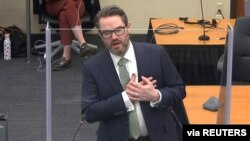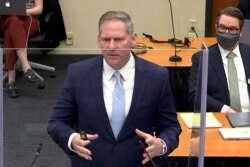A jury in Minneapolis, Minnesota, is hearing closing arguments Monday in the murder trial of former police officer Derek Chauvin, accused of killing a Black man, George Floyd, last year by kneeling on his neck in an incident that triggered widespread protests against police abuse of minorities.
Prosecutor Steve Schleicher summed up the case against Chauvin, 45, the white police officer who held down the handcuffed, 46-year-old Floyd, as he lay prone on a city street and gasped that he could not breathe.
“He was trapped … a knee to his neck,” Schleicher said, with Chauvin’s weight on him for nine minutes and 29 seconds.
“George Floyd was not a threat to anyone,” Schleicher said. “All that was required was some compassion, and he got none.”
The prosecution at the trial, now in its fourth week, argued that Chauvin, a 19-year police veteran before he was fired in the aftermath of Floyd’s death, ignored his police training in the way he arrested Floyd and used excessive force in holding him down. Floyd was accused of attempting to pass a counterfeit $20 bill at a nearby convenience store.
The prosecution contended that Chauvin, with his knee on Floyd’s neck, asphyxiated him. Chauvin has pleaded not guilty to murder and manslaughter charges. If convicted, he faces up to 40 years in prison.
Eric Nelson, Chauvin’s defense attorney, is expected to tell the 12-member, racially diverse jury that Chauvin followed normal police procedures in apprehending Floyd and that the suspect died from a weak heart and underlying drug use, not from the policeman kneeling on his neck.
WATCH: Video report on Derek Chauvin trial
Schleicher’s closing argument lasted an hour and 43 minutes, with the prosecutor repeatedly contending that Floyd "didn’t have to die” last May 25, if only Chauvin had followed his police training and used appropriate force in apprehending Floyd or given him medical assistance when he said he could not breathe.
“He violated police use of force. He did not provide emergency care. He did it on purpose,” Schleicher argued. “He violated his training, and he killed a man.”
The prosecutor claimed that Chauvin was “consciously indifferent” to Floyd’s life.
Schleicher rhetorically asked the jury, “Was this authorized use of force? Was it justified? It was not.”
“This was murder,” Schleicher concluded.
Before the closing arguments, trial judge Peter Cahill read instructions on legal aspects of the case to the jury to apply when it starts considering whether to convict or acquit Chauvin. The judge told the jury not to draw any inference on Chauvin’s innocence or guilt from his declining to testify in the case, as was his right.
Last week, Chauvin invoked his constitutional right against self-incrimination and did not take the witness stand. Under U.S. law, the prosecution must prove the allegations against defendants.
Jurors will be sequestered until they reach a verdict.
As the case nears the end, authorities in the Midwestern city of Minneapolis are braced for possible street protests after the verdict. Many stores are boarded up to prevent a reoccurrence of the damage and looting that took place after Floyd’s death last May.
Protests, some of them violent, broke out in many cities in the U.S. and throughout the world. The Black Lives Matter movement was at the forefront of the demonstrations, but thousands of people who had no previous connection to the Black-led protests joined in to condemn Chauvin’s actions, and more broadly, police treatment of minorities.
The same issues raised by Floyd’s death came to the forefront in the community again when a now-resigned police officer in a Minneapolis suburb fatally shot a 20-year-old African American man during a traffic stop on April 11.







